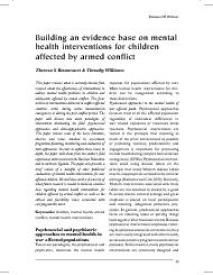Building an evidence base on mental health interventions for children affected by armed conflict
This paper reviews what is currently known from research about the effectiveness of interventions to address mental health problems in children and adolescents affected by armed conflict. The focus will be on interventions delivered in conflict affected countries either during active humanitarian emergencies or during the post conflict period. The paper will discuss two main paradigms of intervention dominating the field: psychosocial approaches and clinical/psychiatric approaches. The paper reviews some of the basic literature, theories and issues involved in assessment, programme planning, monitoring and evaluation of both approaches. In order to explore these issues in depth, the paper will draw from the author’s field experiences with research in the Russian Federation and in northern Uganda. The paper also presents a brief review of a handful of other published evaluations of mental health interventions for war affected children. We will close with a discussion of what future research is needed to build an evidence base regarding mental health interventions for children affected by armed conflict as well as the ethical and feasibility issues associated with carrying out this work. Keywords: children, mental health, armed conflict, mental health interventions
Geachte bezoeker,
De informatie die u nu opvraagt, kan door psychotraumanet niet aan u worden getoond. Dit kan verschillende redenen hebben,
waarvan (bescherming van het) auteursrecht de meeste voorkomende is. Wanneer het mogelijk is om u door te verwijzen naar de bron
van deze informatie, dan ziet u hier onder een link naar die plek.
Als er geen link staat, kunt u contact opnemen met de bibliotheek,
die u verder op weg kan helpen.
Met vriendelijke groet,
Het psychotraumanet-team.
Reference:
Theresa S. Betancourt, Timothy Williams | 2008
In: Intervention: the international journal of mental health, psychosocial work and counselling in areas of armed conflict, ISSN 1571-8883 | 6 | 1 | 39-56
http://www.interventionjournal.com/sites/default/files/6.1_06_Betancourt.pdf
In: Intervention: the international journal of mental health, psychosocial work and counselling in areas of armed conflict, ISSN 1571-8883 | 6 | 1 | 39-56
http://www.interventionjournal.com/sites/default/files/6.1_06_Betancourt.pdf


